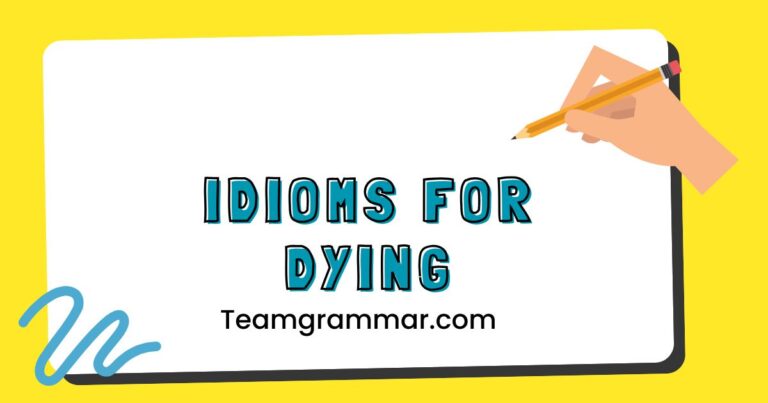39 Idioms for Boring: Spice Up Your English Vocabulary
English is full of colorful expressions, and idioms are among the most vibrant. Mastering idioms related to “boring” not only enhances your vocabulary but also allows you to express nuanced feelings about dull or uninteresting situations.
This article explores a wide range of idioms that describe boredom, their meanings, and how to use them effectively. Whether you’re an English language learner or a native speaker looking to enrich your language skills, this guide will provide you with the tools to articulate your experience of boredom in a creative and engaging way.
This comprehensive guide is perfect for English language learners, ESL/EFL students, teachers, and anyone who wants to improve their understanding and use of English idioms. By the end of this article, you’ll be equipped with a rich vocabulary to describe boredom, making your communication more vivid and engaging.
Table of Contents
- Definition of Idioms for Boring
- Structural Breakdown of Idioms
- Types and Categories of Idioms for Boring
- Examples of Idioms for Boring
- Usage Rules for Idioms
- Common Mistakes with Idioms
- Practice Exercises
- Advanced Topics in Idiomatic Language
- Frequently Asked Questions
- Conclusion
Definition of Idioms for Boring
An idiom is a phrase or expression whose meaning cannot be understood from the literal meanings of the individual words. Instead, the phrase has a figurative meaning that is culturally understood by native speakers.
Idioms related to “boring” are used to describe situations, activities, or people that lack excitement, interest, or stimulation. These idioms provide a more colorful and expressive way to convey the feeling of boredom than simply using the word “boring.”
These idioms often rely on metaphors, similes, and other figures of speech to create a vivid image of dullness or monotony. Understanding and using these idioms effectively requires familiarity with cultural contexts and common expressions in English.
Classification: Idioms can be classified as lexical idioms (where individual words have unusual meanings) and phrasal idioms (where the whole phrase has a non-literal meaning). Idioms for “boring” are typically phrasal idioms.
Function: The primary function of these idioms is to express the subjective experience of boredom. They add color, nuance, and personality to communication, making it more engaging and relatable.
Contexts: These idioms are used in a variety of contexts, including casual conversations, formal writing, and creative storytelling. The appropriate idiom will depend on the specific situation and the desired level of formality.
Structural Breakdown of Idioms
Idioms, by nature, defy strict grammatical rules because their meaning is not derived from the individual words but from the phrase as a whole. However, understanding the structure of idioms can help in recognizing and using them correctly.
Phrase Structure: Most idioms consist of a combination of nouns, verbs, adjectives, and adverbs. The specific arrangement of these elements contributes to the idiom’s unique meaning.
Figurative Language: Idioms often employ figurative language such as metaphors (comparing two unlike things without using “like” or “as”) and similes (comparing two unlike things using “like” or “as”). For example, “watching paint dry” is a metaphor for extreme boredom.
Fixed Expressions: Idioms are generally fixed expressions, meaning that the words cannot be changed or rearranged without altering the meaning or making the phrase nonsensical. For instance, you can’t say “watching varnish dry” and expect it to convey the same meaning as “watching paint dry.”
Grammatical Integration: While idioms themselves are fixed, they can be integrated into larger sentences and often function as verbs, nouns, or adjectives. The grammatical structure of the surrounding sentence is typically standard English.
Types and Categories of Idioms for Boring
Idioms for “boring” can be categorized based on the specific aspect of boredom they describe. Here are some common categories:
1. General Expressions of Boredom
These idioms are used to express a general feeling of being bored without specifying the cause or context.
2. Idioms Describing Monotony
These idioms focus on the repetitive and unchanging nature of a situation or activity, which leads to boredom.
3. Idioms Describing Lack of Interest
These idioms highlight the absence of excitement or stimulation, resulting in a lack of engagement.
4. Idioms Describing Tedious Activities
These idioms specifically refer to activities that are long, slow, and tiresome, causing boredom.
5. Idioms Describing Lifeless Situations
These idioms describe situations or environments that are dull, uninspiring, and devoid of energy.
Examples of Idioms for Boring
Here are several examples of idioms for “boring,” categorized by the type of boredom they express. Each table provides a brief explanation and example sentences to illustrate their use.
General Expressions of Boredom
These idioms convey a general sense of being bored, without specifying the cause. Understanding these expressions can greatly enhance your ability to communicate feelings of boredom effectively.
| Idiom | Meaning | Example Sentence |
|---|---|---|
| Bored stiff | Extremely bored. | I was bored stiff during the lecture. |
| Bored to tears | Extremely bored; so bored that you could cry. | She was bored to tears by the endless meeting. |
| Bored out of my mind | Extremely bored; feeling mentally drained. | He was bored out of his mind waiting for the bus. |
| Bored to death | Extremely bored; feeling that something is tedious and unbearable. | We were bored to death listening to the same stories over and over. |
| Fed up with | Tired or bored with something that has been happening for a long time. | I’m fed up with doing the same chores every day. |
| Had enough | Reached the limit of one’s patience or tolerance. | I’ve had enough of this monotonous job. |
| Tired of | Having lost interest or patience in something. | She’s tired of watching the same old movies. |
| Sick of | Disgusted or bored with something. | I’m sick of hearing the same complaints. |
| Weary of | Tired or bored with something, often after a long period. | He grew weary of the endless paperwork. |
| Had it up to here | To have reached the limit of one’s patience or tolerance. | I’ve had it up to here with all the delays. |
| Want to tear my hair out | To feel extremely frustrated or bored. | This slow internet connection makes me want to tear my hair out. |
| Like watching grass grow | Extremely boring and slow. | Waiting for the computer to load is like watching grass grow. |
| Like watching paint dry | Extremely boring and slow. | The lecture was like watching paint dry. |
| To be in the doldrums | To be in a state of inactivity or stagnation, often leading to boredom. | The project is in the doldrums because of lack of funding. |
| To be a drag | Something or someone that is boring or annoying. | This meeting is such a drag. |
| To be a bore | A person or thing that is boring. | He’s such a bore to talk to at parties. |
| To be a snooze fest | An event or activity that is extremely boring. | The conference was a snooze fest; I almost fell asleep. |
| To be deadly dull | Extremely boring. | The presentation was deadly dull. |
| To be as dull as dishwater | Extremely boring and uninteresting. | The conversation was as dull as dishwater. |
| To be mind-numbing | Extremely boring and repetitive. | The repetitive tasks at work are mind-numbing. |
| To be soul-destroying | Something that makes you feel very unhappy because it is extremely boring. | This job is soul-destroying; I need to find something more fulfilling. |
| To be humdrum | Lacking excitement or variety; monotonous. | Life in the suburbs can be humdrum. |
| To be a yawn | Something that is boring. | The movie was a yawn; I couldn’t wait for it to end. |
Idioms Describing Monotony
These idioms highlight the repetitive and unchanging nature of a situation or activity, leading to boredom. These are useful for describing routines or tasks that lack variety.
| Idiom | Meaning | Example Sentence |
|---|---|---|
| Same old, same old | The same routine or situation as always, often implying boredom. | “How’s work?” “Same old, same old.” |
| Stuck in a rut | Being in a monotonous or unchanging situation. | I feel like I’m stuck in a rut, doing the same things every day. |
| Going through the motions | Doing something without enthusiasm or genuine interest. | He was just going through the motions at work, not really caring about the outcome. |
| On repeat | Happening over and over again. | The same song playing on repeat is starting to get annoying. |
| Groundhog Day | A situation in which events appear to be repeating themselves endlessly. | Every day at this job feels like Groundhog Day. |
| A broken record | Repeating the same thing over and over again. | He sounds like a broken record, always complaining about the same issues. |
| The daily grind | The routine of daily work or activities, often seen as tedious. | I’m tired of the daily grind; I need a vacation. |
| To be in a groove | To be stuck in a monotonous or predictable routine. | He was in a groove with his work, doing the same tasks every day. |
| To be like a treadmill | A repetitive and monotonous activity. | This job feels like a treadmill, I’m not getting anywhere. |
| To be going around in circles | To be doing something without making any progress. | We’re going around in circles with this project; we need a new approach. |
| To be long in the tooth | Something that has been going on for too long, making it boring. | This project is getting long in the tooth; we should wrap it up. |
| To be dragging on | Continuing for too long in a tedious or boring way. | The meeting is dragging on; I wish it would end. |
| Day in, day out | Every day; continuously. | Day in, day out, I do the same thing at work. |
| To do the same old thing | To engage in the same routine activities. | I am so tired of doing the same old thing every weekend. |
| To go through the mill | To experience a difficult or tedious process. | Applying for this job was going through the mill with all the paperwork. |
| Rinse and repeat | To do something over and over again. | The process is simple: rinse and repeat until the task is completed. |
| Run-of-the-mill | Ordinary and not special. | The movie was just run-of-the-mill; nothing exciting happened. |
| Stale | No longer fresh or interesting. | The jokes were getting stale after hearing them so many times. |
| Tiresome | Causing one to feel bored or annoyed. | The repetitive nature of the work made it tiresome. |
| Monotonous | Lacking in variety and interest. | The monotonous drone of the engine made it hard to stay awake. |
Idioms Describing Lack of Interest
These idioms highlight the absence of excitement or stimulation, resulting in a lack of engagement. They are perfect for describing situations where your attention simply cannot be held.
| Idiom | Meaning | Example Sentence |
|---|---|---|
| Couldn’t care less | Not interested or concerned at all. | I couldn’t care less about the latest celebrity gossip. |
| Not my cup of tea | Not something that one enjoys or is interested in. | Opera is not my cup of tea. |
| Doesn’t float my boat | Not something that one enjoys or is interested in. | That type of music doesn’t float my boat. |
| Doesn’t ring a bell | Not familiar or not remembered. | That name doesn’t ring a bell. |
| Goes in one ear and out the other | To hear something but pay no attention to it. | Everything he says goes in one ear and out the other. |
| Zone out | To stop paying attention and become unaware of one’s surroundings. | I tend to zone out during long lectures. |
| Tune out | To stop listening to or paying attention to someone or something. | I often tune out when he starts talking about politics. |
| Switch off | To stop paying attention or thinking about something. | I just switch off when the meeting gets too technical. |
| Glaze over | To become inattentive or unresponsive, often due to boredom. | His eyes started to glaze over as I explained the complex details. |
| Lose interest | To stop being interested in something. | I quickly lost interest in the conversation. |
| Not hold my attention | Failing to keep someone interested or engaged. | The movie did not hold my attention. |
| To be apathetic | Showing or feeling no interest, enthusiasm, or concern. | He was apathetic towards the project’s success. |
| To be indifferent | Having no particular interest or sympathy; unconcerned. | She seemed indifferent to the news. |
| To not give a fig | To not care at all. | I do not give a fig about what he thinks. |
| To not lift a finger | To not make any effort to help. | He did not lift a finger to assist with the cleanup. |
| To not bat an eye | To show no surprise or concern. | She did not bat an eye when she heard the news. |
| To not turn a hair | To show no emotion or reaction. | He did not turn a hair when he was criticized. |
| To have no interest | To not be interested in something. | I have no interest in sports. |
| To not take to something | To not develop a liking for something. | I did not take to the new job. |
| To be out of it | Not paying attention or not fully aware of what is happening. | I was completely out of it during the lecture. |
Idioms Describing Tedious Activities
These idioms specifically refer to activities that are long, slow, and tiresome, causing boredom. They are perfect for describing chores, repetitive tasks, or overly detailed processes.
| Idiom | Meaning | Example Sentence |
|---|---|---|
| A long haul | A task or journey that takes a long time and requires a lot of effort. | The project is a long haul, but we’ll get there eventually. |
| A never-ending story | Something that seems to go on forever, often in a tedious way. | Dealing with bureaucracy is a never-ending story. |
| Like pulling teeth | Very difficult or reluctant. | Getting him to agree was like pulling teeth. |
| A chore | A task that is boring and unpleasant. | Doing the laundry is such a chore. |
| A drag | Something that is boring or annoying. | Filling out these forms is a drag. |
| A grind | A tedious and laborious task. | Studying for the exam was a grind. |
| A slog | A long, difficult, and tiring task or journey. | The hike up the mountain was a slog. |
| To be a burden | A duty or responsibility that is tiresome or onerous. | Taking care of the garden has become a burden. |
| To be a trial | A person or thing that causes trouble or annoyance. | Dealing with customer complaints is a trial. |
| To be an ordeal | A painful or horrific experience, especially a protracted one. | The surgery was an ordeal. |
| To be a labor of love | A task done for pleasure, not reward, despite being laborious. | Restoring the old car was a labor of love. |
| To be a thankless task | A job that receives no appreciation or recognition. | Cleaning up after the party is a thankless task. |
| To be like wading through treacle | Extremely slow and difficult. | The process of getting a loan was like wading through treacle. |
| To be like wading through mud | Slow and difficult. | Trying to understand his explanation was like wading through mud. |
| To be a pain in the neck | Someone or something that is very annoying. | Dealing with these technical issues is a pain in the neck. |
| To be a headache | A problem or annoying situation. | Organizing the event was a headache. |
| To be a hassle | Causing inconvenience or difficulty. | Traveling during peak hours is a hassle. |
| To be a nuisance | A person, thing, or circumstance causing inconvenience or annoyance. | Mosquitoes are a nuisance in the summer. |
| To be a bind | A difficult or annoying situation. | Having to work overtime is a bind. |
| To be a dog’s life | A miserable and unpleasant existence. | Working in those conditions is a dog’s life. |
Idioms Describing Lifeless Situations
These idioms describe situations or environments that are dull, uninspiring, and devoid of energy. They are perfect for describing places, events, or people that lack vibrancy or excitement.
| Idiom | Meaning | Example Sentence |
|---|---|---|
| A dead loss | Completely useless or unsuccessful. | The party was a dead loss; no one showed up. |
| A washout | A complete failure. | The event was a washout due to the bad weather. |
| A damp squib | Something that is initially exciting but ultimately disappointing. | The fireworks display was a damp squib. |
| A ghost town | A town that is deserted and lifeless. | The small village became a ghost town after the factory closed. |
| A still life | A situation lacking movement or excitement. | The office environment felt like a still life. |
| A one-horse town | A small, dull, and unexciting place. | He grew up in a one-horse town. |
| As lively as a morgue | Extremely quiet and lifeless. | The library was as lively as a morgue. |
| To be a drag on society | Someone who is boring and uninteresting. | He is such a drag on society because he never contributes anything. |
| To be a wet blanket | Someone who spoils other people’s fun. | Don’t be a wet blanket; let’s enjoy ourselves. |
| To be the kiss of death | Something that will certainly cause failure. | His involvement was the kiss of death for the project. |
| To be a graveyard | A place that is very quiet and lifeless. | The office was like a graveyard on a Sunday. |
| To be a vacuum | A state of emptiness or lack of interest. | The meeting seemed to exist in a vacuum. |
| To be a blank canvas | A situation that is devoid of ideas or interest. | The project started as a blank canvas. |
| To be a slow burn | Something that starts slowly and gradually becomes more interesting. | The movie was a slow burn, but it got better towards the end. |
| To be in the doldrums | To be in a state of inactivity or stagnation. | The company was in the doldrums after the recession. |
| To be in limbo | To be in an uncertain or undecided state. | The project was left in limbo due to lack of funding. |
| To be in the wilderness | To be in a state of neglect or obscurity. | The artist felt like he was in the wilderness after the negative reviews. |
| To be a backwater | A place that is isolated and undeveloped. | The town felt like a backwater. |
| To be a dead end | A situation that leads to nowhere. | The investigation reached a dead end. |
| To be a passing fad | Something that is popular for only a short time. | The trend turned out to be just a passing fad. |
Usage Rules for Idioms
Using idioms correctly requires attention to context, tone, and audience. Here are some rules to guide you:
- Context is Key: Choose idioms that are appropriate for the situation. Some idioms are informal and should be avoided in formal settings.
- Know Your Audience: Consider your audience’s familiarity with idioms. Avoid using obscure or culturally specific idioms that may not be understood.
- Maintain Consistency: Use idioms consistently within your writing or speech. Mixing idioms or using them incorrectly can confuse your audience.
- Don’t Overuse: While idioms can add color to your language, overuse can make your communication sound unnatural or forced.
- Pay Attention to Grammar: Even though idioms are fixed expressions, they still need to be grammatically integrated into the sentence. Ensure that the verb tense and subject-verb agreement are correct.
Common Mistakes with Idioms
Here are some common mistakes people make when using idioms, along with correct examples:
| Incorrect | Correct | Explanation |
|---|---|---|
| I’m bored to death of this movie. | I’m bored to death by this movie. | The correct preposition is “by” when indicating the cause of boredom. |
| He’s stuck in a hole. | He’s stuck in a rut. | The correct idiom is “stuck in a rut,” referring to a monotonous situation. |
| It’s not my glass of tea. | It’s not my cup of tea. | The correct idiom is “not my cup of tea,” meaning not something one enjoys. |
| I couldn’t care more. | I couldn’t care less. | “Couldn’t care less” means not interested at all. |
| He is a wet scarf. | He is a wet blanket. | The correct idiom is “wet blanket,” referring to someone who spoils fun. |
Practice Exercises
Test your understanding of idioms for “boring” with these exercises. Fill in the blanks with the appropriate idiom from the list provided.
- bored stiff
- stuck in a rut
- not my cup of tea
- couldn’t care less
- watching paint dry
- same old, same old
- mind-numbing
- a snooze fest
- going through the motions
- deadly dull
| Question | Answer |
|---|---|
| 1. The lecture was so long and uninteresting; I was __________. | bored stiff |
| 2. I feel like I’m __________; I need to find a new hobby or activity. | stuck in a rut |
| 3. Horror movies are __________, I prefer comedies. | not my cup of tea |
| 4. I __________ about what he thinks; his opinion doesn’t matter to me. | couldn’t care less |
| 5. Waiting for the computer to update is like __________. | watching paint dry |
| 6. “How’s work?” “__________.” | same old, same old |
| 7. The repetitive tasks at my job are __________. | mind-numbing |
| 8. The conference was __________; I almost fell asleep. | a snooze fest |
| 9. He’s just __________ at work; he doesn’t seem to care about the quality of his work. | going through the motions |
| 10. The presentation was __________; I couldn’t stay awake. | deadly dull |
Exercise 2: Choose the correct idiom to complete each sentence.
-
Choose the correct idiom to complete the sentence: “I’m so tired of this job, I feel like I’m __________. ”
- going around in circles
- walking on clouds
- flying high
-
Choose the correct idiom to complete the sentence: “He’s always complaining; he sounds like __________. ”
- a breath of fresh air
- a broken record
- a ray of sunshine
-
Choose the correct idiom to complete the sentence: “The movie was so boring, it was __________. ”
- a roller coaster
- a yawn
- a free ride
-
Choose the correct idiom to complete the sentence: “I tried to stay awake, but the lecture was so __________. ”
- as lively as a party
- as dull as dishwater
- as bright as day
-
Choose the correct idiom to complete the sentence: “She’s so disinterested in everything; she just __________. ”
- zones out
- tunes in
- lights up
-
Choose the correct idiom to complete the sentence: “I don’t care what he thinks; I __________. ”
- give a hoot
- give a fig
- give a hand
-
Choose the correct idiom to complete the sentence: “The task was difficult and took a long time; it was __________. ”
- a piece of cake
- a long haul
- a walk in the park
-
Choose the correct idiom to complete the sentence: “He never helps with the chores; he doesn’t __________. ”
- lift a finger
- lend an ear
- turn a blind eye
-
Choose the correct idiom to complete the sentence: “The town is deserted and lifeless; it’s like __________. ”
- a bustling city
- a ghost town
- a thriving metropolis
- Choose the correct idiom
Advanced Topics in Idiomatic Language
For those looking to deepen their knowledge of idioms, here are some advanced topics to explore:
- Etymology of Idioms: Investigate the origins and historical context of specific idioms. Understanding the etymology can provide insights into their meanings and usage.
- Cultural Variations: Explore how idioms vary across different English-speaking cultures. Some idioms may be unique to certain regions or countries.
- Idioms in Literature: Analyze how authors use idioms to enhance their writing and convey deeper meanings.
- Creating New Idioms: Understand the processes by which new idioms are formed and become part of the language.
- Cognitive Linguistics: Study the cognitive processes involved in understanding and using idioms, including metaphor, metonymy, and conceptual blending.
Frequently Asked Questions
Conclusion
Mastering idioms for “boring” can significantly enhance your English vocabulary and communication skills. By understanding the meanings, usage rules, and common mistakes associated with these idioms, you can express your feelings of boredom more effectively and engage your audience in a more vivid way.
Continue to practice and explore the rich world of idiomatic language to become a more fluent and expressive English speaker.







